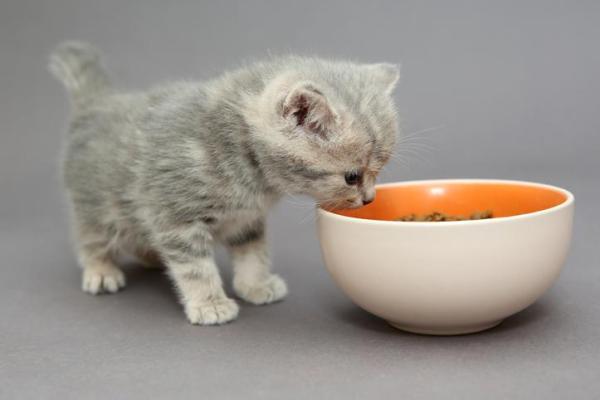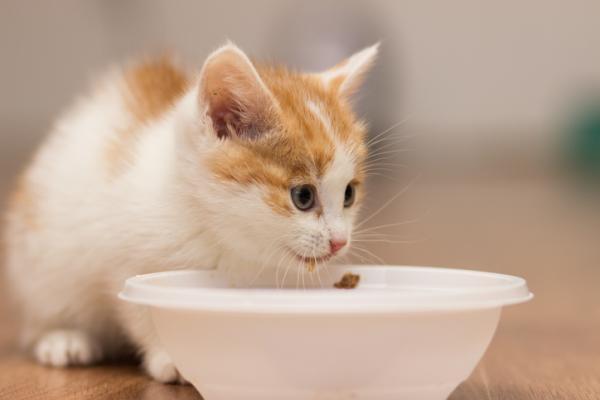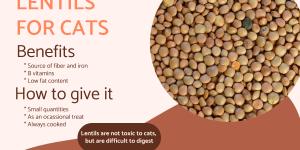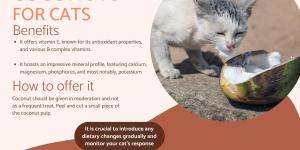Can Kittens Eat Adult Cat Food?



See files for Cats
There are many different types of cat food available. We are not only referring to brands on the commercial market. Homemade food, for example, is becoming more popular among feline guardians. The amount of options can make us more confused than should be the case. For some of us, the variety can make it seem like something is amiss. Since cats in the wild eat what they can get, is there need to have so many different types of cat food? Should all cats not eat the same type of food?
At AnimalWised, we answer the question can kittens eat adult cat food? In doing so, we will not only better understand the diet of kittens, but we can understand the different factors involved in choosing the right food for our cat.
Understanding a kitten's diet
By definition, a kitten is a young cat in the process of developing into an adult. This process is one of relatively rapid growth which is greatly affected by their metabolism. In order for a kitten to develop properly, they will need a lot of food. This provides them with the nutrients for their body to grow and the energy to explore their environment. Since felines are obligate carnivores, the most important nutrient required in their diet is protein.
As mammals, kittens will obtain their initial food energy from their mother's milk. While we will do what we can to help them develop, the mother will be in charge of adapting their diet. When the kitten is a newborn, milk is sufficient to meet all of their developmental needs. Eventually, the mother will begin the weaning period at about 8 weeks. During this time she will encourage them to eat solid food (which we will need to provide).
Unless there is a threat to their health, kittens should not be removed from their mothers until at least 8 weeks of life, although preferably up to 12. Once the kitten arrives in our home, we will need to provide them with food to sustain them. Since the kittens should be weaned by their mother, this means we should only have to provide solid food.
If a kitten has been separated prematurely from their mother, then we should know what to expect. Not only will the kitten not be able to eat adult cat food, they will not be able to eat solid food at all. Instead, they will need to be given a formula or replacement kitten milk. While you can buy this from a pet store or veterinarian, our article on what to feed a one month kitten will explain in detail what you need to consider.
Kibble for kittens will have similar nutrients compared to commercial feed for adult cats. However, there are other factors involved in its composition. It will often have higher levels of fat content compared to adult cat food. The reason for this is because they need more energy. Also, the individual pieces of food will be smaller so the young cat can eat without choking. This is the same for both dry and wet cat food.
You can provide homemade food for kittens, but this is often not recommended. The reason is because they are at a delicate stage of life. If we miss any of their essential nutrients, it could hurt their development. If you are considering a homemade diet for kittens, it is vital you discuss it with your veterinarian first.
For all the above reasons, if a kitten is able to eat solid food, it is best to provide them with a kitten-specific option.
Feeding adult cats
Kittens usually reach their adult size around 6-8 months of age. Therefore, adult feeding can begin around this age, although many foods delay the change until the one year mark. When choosing the right food for our cat, we need to check the label, consult with the veterinarian and observe the evolution of the cat.
When a cat becomes adult, we are not as concerned about their development. Instead, we need to maintain their health levels. At any stage of life, a cat will need quality food. For an adult, this is one which meets their nutritional needs, prevents them from becoming obese and allows them to expend energy at appropriate levels We also need to consider whether a cat has been neutered as this can affect their food consumption.
Finally, we need to consider the health of the cat. Our veterinarian will be able to provide specifics, but if they have hormone imbalances (due to hyperthyroidism, for example), diabetes or other health issues, they will need an amended diet.
For all of these reasons, we need to choose a cat food which meets the needs of the specific adult cat. This could be one for cats which are sterilized, have kidney problems, a propensity to get hairballs or any other specific reason. Once the adult cat becomes older, their metabolism will change again. In these cases, they will need a diet suitable for senior cats.

Can kittens eat adult cat food?
The answer to the question about whether a kitten can eat adult cat food is that it is not recommended. This is similar to how cats should not eat dog food. In context of the factors stated above, adult cat food is not suited to meet the needs of a developing kitten. Not only this, but it can cause issues with their development over prolonged periods.
There are some commercial cat feed brands which offer cat food suitable for all ages of cats. In these cases, the product should be specially formulated so that it will not cause any harm to the kitten. We should check the quality of the cat food, but if it has good reviews, we can likely trust it as being suitable for our kitten.
As you can see, cat foods, whether they are feed or wet food, are marketed by specifying whether they are suitable for kittens, adult or senior cats. In addition to the quality that should always guide us in the choice, we will have to look for the variety that best suits the conditions of our individual cat.

What happens if I feed my kitten adult food?
The fact that it is not the most appropriate for a kitten to eat adult cat food does not mean that something serious will happen if we occasionally are forced to feed them adult food. If we run out of kitten food and are unable to get some more at feeding time, we can give the kitten adult cat food to tide them over. If it is dry kibble, we should soften it with water to ensure they do not choke on the larger pieces.
However, prolonged consumption of adult cat food could cause alterations in health or development of the kitten. In general, the quality with which commercial diets for cats are formulated today makes it very difficult for us to see serious problems.
If the kitten does present any symptoms of a health problem which may be related to the consumption of adult cat food, we need to take them to a veterinarian. An example of such a health problem might be a five-month-old kitten with struvite crystals causing a urinary tract blockage.
If you want to read similar articles to Can Kittens Eat Adult Cat Food?, we recommend you visit our Healthy diets category.
- Pérez de Ayala, S. (2017). Special characteristics of feline nutrition. Ateuves, 27, 14-18.






